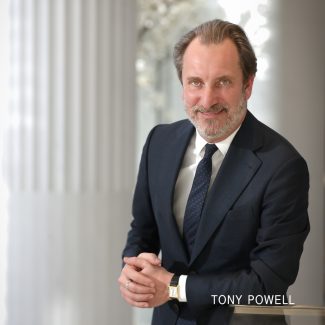Tiffany & Co., helmed by Alessandro Bogliolo, celebrates a landmark opening in the nation’s capital.
 Iconic shouldn’t be a word that gets bandied about or spoken lightly, especially in discussions about fashion. In brand speak, it means that unwavering support from loyal customers can effectively combat shifting trends and roller coaster economies. For Alessandro Bogliolo, being CEO of the iconic Tiffany & Co. requires a divided effort —leading with one foot grounded in the history and legacy upon which the jeweler was built in 1837 and the other facing toward the future. The charismatic 53-year-old is well versed in the modernist retail approach, having had leadership roles at Sephora, Bulgari and most recently Italian fashion brand Diesel before starting at Tiffany’s in 2017.
Iconic shouldn’t be a word that gets bandied about or spoken lightly, especially in discussions about fashion. In brand speak, it means that unwavering support from loyal customers can effectively combat shifting trends and roller coaster economies. For Alessandro Bogliolo, being CEO of the iconic Tiffany & Co. requires a divided effort —leading with one foot grounded in the history and legacy upon which the jeweler was built in 1837 and the other facing toward the future. The charismatic 53-year-old is well versed in the modernist retail approach, having had leadership roles at Sephora, Bulgari and most recently Italian fashion brand Diesel before starting at Tiffany’s in 2017.
According to Bogliolo that strategy means: “You take the best of your tradition – that is the craftsmanship – but you combine it with new designs and especially the understanding of new generations because times have changed.” On the design front, he counts Tiffany’s Chief Artistic Officer Reed Krakoff as a major source of “freshness” to the company. As for shifting retail models, Bogliolo gestures to the Washington-specific features in the new light-filled Tiffany & Co. store which opened in CityCenterDC earlier this year. Out of 300 locations worldwide, the 5,000-square-foot space is the brand’s first concept store that incorporates details of place – think marble columns and Union Station-esque design. “This is a big evolution,” Bogliolo explains. “It’s about being more relevant for the community and giving different experiences in different stores.” The effort to be more thoughtful is a reflection of the millennial buying power’s desire for meaningful shopping experiences beyond those that are purely transactional.
The store’s opening on New York Ave. NW doesn’t just solidify the jeweler’s long rich history in the nation’s capital—it testifies to the brand’s staying power. As the preferred jeweler to presidents and other major luminaries as well as the designer of the Great Seal of the United States, Tiffany’s is the ultimate “American institution,” Bogliolo says. A number of Tiffany’s most famous pieces drawn from its vast archival collection were on display at the store’s opening to punctuate the relationship.
Legacy aside, it will be Bogliolo’s balanced vision that will push the brand forward. “We are not a museum,” he says. “If we were, we would just take care of protecting our legacy. But we are a brand and our mission is to write a new page every day.”




